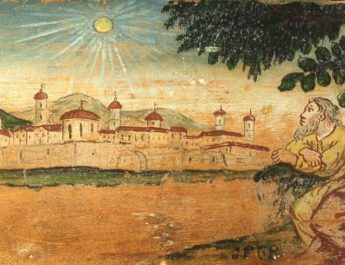Isaiah 11:1-10
Advent A2
A shootA shall come out from the stumpB of Jesse,C
and a branchD shall growE out of his roots.
2 The spiritF of the LordG shall restH on him,
the spirit of wisdomI and understanding,J
the spirit of counselK and might,L
the spirit of knowledgeM and the fearN of the Lord.
A “shoot” = choter. 2x in OT – here and in Prov 14:3 “the talk of fools is a rod for their backs.” This word is branch, twig, shoot, or rod.
B “stump” = geza. 3x in OT. The root may refer to cutting down trees. This could be a stump from a tree that was cut down or a tree that has been planted and is still growing. This word is stock, stem, stump, or trunk.
C “Jesse” = yishay. The origin of this name is uncertain. It may be related to yesh – a word that means being, substance, or existence.
D “branch” = netser. 4x in OT. From natsar (to watch, guard, keep, observe; to protect, obey, or to conceal). This is a sprout, shoot, branch – a plant that is green. It is used figuratively for descendants.
E “grow” = parah. To bear fruit, be fruitful, grow, increase – in a literal or figurative sense. This is the root where the name “Ephraim” came from.
F “spirit” = ruach. This is breath, wind, air, cool, spirit. This is wind, which resembles the breath and so this can be used figuratively for life itself or being frail/mortal/impermanent. It can refer to the air of the sky or the spirit.
G “Lord” = YHVH. From havah (to be, become) or hayah (to come to pass, become, be). This is the name of the God of Israel, the self-existent and eternal one, the tetragrammaton. This pronunciation has been lost to time so “Lord” is generally used in its place.
H “rest” = nuach. To rest, lay down, place, remain, satisfy, allow, appease, calm. Also to settle down, camp. This word is used in the fourth commandment about sabbath rest. It is also the root that Noah is based on.
I “wisdom” = chokmah. From chakam (to be or become wise, teach wisdom. To demonstrate wisdom of mind, speech, or action). This is wisdom, wit, skillfulness.
J “understanding” = binah. From bin (to discern, consider, attend. To separate or distinguish in one’s mind). This is understanding, consideration, discernment. It can also be used for knowledge or wisdom.
K “counsel” = etsah. From yaats (to advise, counsel, consult, determine, devise). This is advice, purpose, or prudence. It includes the sense of having a thought out plan.
L “might” = geburah. From gabar (to be strong, mighty, strengthen, prevail, be great, be valiant. Can also mean to act in an insolent way). This word is strength, might, courage, power, triumph, or mastery. It is force literally or figuratively and implies valor or victory.
M “knowledge” = daat. From yada (to know, be aware, to figure out by seeing literally or figuratively. It includes observing, attention, and recognition. So it can be used for instruction. Also, a euphemism for sexual intercourse). This is knowledge or cunning.
N “fear” = yirah. From yare (to fear, make afraid, put in fearful reverence). This is fear or reverence. Here, fear is a posture that recognizes how great and different God is from mortals. This leads one to a posture of humility and awe, wisdom and worship.
3 His delightO shall be in the fear of the Lord.
He shall not judgeP by what his eyes see,Q, R
or decideS by what his ears hear;T, U
4 but with righteousnessV he shall judge the poor,W
and decide with equityX for the meekY of the earth;
he shall strikeZ the earth with the rodAA of his mouth,
and with the breathBB of his lips he shall killCC the wicked.DD
5 Righteousness shall be the belt around his waist,
and faithfulnessEE the belt around his loins.
O “delight” = ruach. 11x in OT. This is perhaps related to the word for “spirit” in v2. Properly, this word is the notion of something blowing like breath. So, literally, it refers to a smell or scent. Figuratively, it refers to perceiving something or anticipating/enjoying something. The word is frequently used for God smelling the pleasing odor of a sacrifice i.e. accepting that sacrifice.
P “judge” = shaphat. This is to judge, govern, argue a case, decide, defend, deliver, plead, vindicate. This word is used for human judges and for God as Judge. It means declaring a sentence of innocence or guilt, which implies vindicating or punishing. By extension, this word can be used for governing a people.
Q “see” = mareh. From root verb meaning to see. This word is a sight, appearance, vision, or form. This is the act of seeing, that which is seen, something that draws attention, or a vision in one’s mind.
R Literally “and not by the sight of his eyes he shall judge.”
S “decide” = yakach. This is to decide, judge, prove, convince, argue. It can also mean reason together, reprove, rebuke, or plead.
T “hear” = mishma. 1x in OT. From shama (to hear, which implies listening attentively and so obeying). This refers to that which is heard, like a report.
U Literally “nor by the hearing of his ears decide.”
V “righteousness” = tsedeq. This is rightness, righteousness, vindication. It is everything that is just or ethical. That which is right in a natural, moral, or legal sense. It also includes just weights (i.e. true weights). Figuratively, this is justice, righteousness, equity – even prosperity.
W “poor” = dal. From dalal (to hang, be low, languish, fade, be emptied, be unequal, be impoverished, be made thin. Properly, to be slackened or weakened. Figuratively, to be oppressed). So, this word is properly dangling, which implies being weak or thin. This is a poor or needy person.
X “equity” = mishor. From yashar (to be smooth, straight, right, agreeable, pleasing, evenly applied, fit. Figuratively, this is to be right, pleasant, prosperous, or direct). So, this word is a level place, a plain. Figuratively, it is a concord. That which is straight is figuratively that which is just or equitable – a level playing field for all.
Y “meek” = anav. From anah (be bowed down, afflicted, abased, looking down. This is to depress literally or figuratively). This is someone depressed in mind or circumstances. So, someone who is needy, poor, afflicted, lowly.
Z “strike” = nakah. To strike either lightly or hard, literally or figuratively. So could be a simple hit, giving wounds, punishing, or killing.
AA “rod” = shebet. The root probably meant to branch off. Literally, this word is a stick that is used in many purposes such as punishing, fighting, ruling, or walking. So, it would include a rod, staff, club, or scepter. Figuratively, this word is used for a clan.
BB “breath” = ruach. Same as “spirit” in v2.
CC “kill” = mut. This word can mean to die literally or figuratively. Here, it is used in the causative sense to kill.
DD “wicked” = rasha. This is that which is morally wrong. Concretely, it refers to a person who is actively doing evil things. So, wicked, criminal, evil person, guilty, condemned. This word would not correlate to the way that we say we are all sinners and all have fallen short of the glory of God. This would be someone embracing evil in an unapologetic way.
EE “faithfulness” = emunah. From aman (to believe, endure, fulfill, confirm, support, be faithful, put one’s trust in, be steadfast. Figuratively, this is to be firm, steadfast, or faithful, trusting, believing, being permanent, morally solid). This word is literally firmness, but figuratively fidelity, faithfulness, honesty, responsibility, trust, truth, steadfastness. This word shares a root with the word “Amen.”
6 The wolfFF shall liveGG with the lamb,HH
the leopardII shall lie down with the kid,JJ
the calfKK and the lionLL and the fatlingMM together,NN
and a littleOO childPP shall leadQQ them.
7 The cow and the bearRR shall graze,
their youngSS shall lie down together;
and the lionTT shall eat straw like the ox.
8 The nursing childUU shall playVV over the hole of the asp,WW
and the weaned childXX shall putYY its hand on the adder’sZZ den.AAA
FF “wolf” = zeeb. 7x in OT – 2x to describe the world to come where wolf and lamb live together (Isa 11:6) (Isa 65:25), 2x to describe Israel’s wickedness (Ezek 22:27) (Zeph 3:3), 1x to describe Benjamin as a warring tribe (Gen 49:27), 1x to describe God’s judgment (Jer 5:6), 1x to describe the fearsomeness of Babylon’s army (Hab 1:8)
GG “live” = gur. Properly, this is the act of turning off the road for any reason. So, it means sojourning, becoming a guest. It can mean being fearful since one is outside of home territory. It can also mean dwelling, living, or inhabiting if one has turned off the root to encamp for a longer duration. This word is where the Hebrew ger comes from, which is the word translated “stranger” or “resident alien.”
HH “lamb” = kebes. May be from a root that means to dominate. This would refer to a ram who had just reached the age of head butting. This word is also used for lambs for holy sacrifice and lambs that give wool. Also used figuratively as grazing as a symbol of destruction.
II “leopard” = namer. 6x in OT – including “can…leopards change their spots?” (Jer 13:23). Root may mean to filter to this would be a creature that is spotted or stained as if by dripping liquid.
JJ “kid” = gedi. 16x in OT. Root may mean to cut off. This is a young goat. It is the same word used when Rebekah schemes with Isaac to use the skins of goats to cover his arms and fool Isaac.
KK “calf” = egel. Root may mean to go in a circle. Hence, a male calf that skips and frolics around. This word is generally used for an almost full grown cow. It is also the word used for the golden calf in Ex 32.
LL “lion” = kephir. This word specifically refers to a young lion. This is not related to the tasty yogurt drink “kefir.”
MM “fatling” = meri. 8x in OT. This refers to cattle that are fed in the stall as opposed to cattle that graze.
NN These animals listed are not just predator and prey. All of the predator animals are wild and associated with the wilderness and the prey are domesticated, associated with towns, homes, and livelihoods. So, this uniting is not just about predatory violence coming to an end, but also about the removal of distinction between the safe home area and the dangerous wilderness outside town. This is no more distinction between city and country, no more fear of traveling, no more fear of loss of livelihood or life from powerful creatures.
OO “little” = qatan. This can be least, small, young, or unimportant. It could refer to age, size, or quantity.
PP “child” = naar. May be from na’ar (to shake, toss up and down, tumble around). This is a child or a servant. It is a child in their active years so they could be aged anywhere from infancy to adolescence. The passage reads very differently when we imagine the child at different ages. Just like the prey animals were in danger of the wild animals, so where the young children.
QQ “lead” = nahag. This is to drive flocks, people, animals, or vehicles (such as chariots). The child is leading them as a shepherd leads their sheep – the child is guiding and impelling them onward.
RR “bear” = dob. 12x in OT. From dabab (to move gently, glide, flow gently). This is a bear – perhaps as moving slowly?
SS “young” = yeled. From yalad (to bear, bring forth, bear young; used medically for one who acts as midwife or specifically for demonstrating lineage). This is literally something born – so a child, fruit, or offspring of any sort.
TT “lion” = ari. Different from the word used for lion in v6. Root may mean to pluck or pierce. This is a lion or young lion.
UU “nursing child” = yanaq. This is a verb that means to suck – can by used for a nursing mother or for an infant who is still nursing. Literally, then, this is a “sucker.”
VV “play” = sha’a. 9x in OT. This is to stare, be smeared over, cry out, be blinded, play, or make sport. Can mean to look at something in dismay as staring or shrieking or to look fondly – to please or amuse oneself.
WW “asp” = pethen. 6x in OT. Frequently, animal designations or uncertain today or they were less specific then than we are now. This could be a cobra, adder, or asp. It is some kind of venomous snake. The root may mean to twist.
XX “weaned child” = gamal. This is recompense, requite, reward. It is dealing with someone according to their past actions – as a benefit or a punishment. It can also mean to ripen or wean.
YY “put” = hadah. 1x in OT. This is to stretch one’s hand out.
ZZ “adder’s” = tsepha. 5x in OT. Root may mean to extrude. This is an adder, viper, or some other serpent that hisses.
AAA “den” = murah. 1x in OT. From or (to be or become light, brighten, dawn, enlighten, illuminate, kindle).This is something that is lighted or a hole for light, an aperture. By implication, this includes a crevice or hole through which light is shining – so a place where a serpent might live.
9 They will not hurtBBB or destroyCCC
on all my holyDDD mountain;
for the earth will be fullEEE of the knowledgeFFF of the Lord
as the waters cover the sea.
10 On that day the root of Jesse shall standGGG as a signalHHH to the peoples; the nationsIII shall inquireJJJ of him, and his dwellingKKK shall be glorious.LLL
BBB “hurt” = ra’a. Literally, this is to destroy something by breaking it into pieces. Figuratively, it is to cause something to be worthless or bad physically, socially, or morally. This word can be to be evil, bad, afflict, displease, harm, break down, do mischief. This is the root where the Hebrew word for “evil” comes from. The concept includes anything that is not how it ought to be: a natural disaster, a disfigurement, illness, pain, sin, wickedness, etc. It is less that a hurricane or deformity is evil and more that it goes against how God generally orders the universe. Here, harm and destruction is categorically said to be antithetical to God’s will for humanity.
CCC “destroy” = schachath. This is to decay and so to ruin literally or figuratively. It is to perish, mar, or spill.
DDD “holy” = qodesh. This is set apart and so sacred. God is different from us and so God is holy/set apart. Things we dedicate to God’s service are set apart for God and so they, too, are holy, etc.
EEE “be full” = male. This is to fill, accomplish, confirm, consecrate, replenish, or satisfy.
FFF “knowledge” = deah. 6x in OT. Related to “knowledge” in v2. Also has yada as its root (see above, note M).
GGG “stand” = amad. This is stand literally. Also, to take a stand, to act, continue, endure, defend, establish, persist, rise up as a foe.
HHH “signal” = nes. From nasas (to be high or noticeable, displayed, sparkling. To be lifted up as a flag; to gleam from afar). This is a standard, ensign, signal, sign, banner, sail, warning, pole, distinguishing mark. Generally it is a signal; figuratively, a token.
III “nations” = goy. Generally refers to the Gentile nations.
JJJ “inquire” = darash. To seek, ask, inquire. Properly, to tread – usually to pursue or search after. It implies asking. Can be used specifically for worshiping. This same root is where the word midrash comes from – a Jewish commentary and storytelling Biblical interpretive method.
KKK “dwelling” = menuchah. Related to “rest” in v2. This is from manoach (a resting place; the condition of resting or quiet; so, a place that is settled like a home); from nuach (see above, note H). This is a peaceful place, a resting place, comfortable, ease, quiet, still. It is used figurative for consolation and specifically for marriage. Concretely, it refers to a house. This word is used in Ps 23:2 the Lord, “leads me beside still waters.”
LLL “glorious” = kabod. From kabad (to be heavy, weighty, burdensome). This is weighty. Figuratively, glorious, abundant, riches, honor, splendor – a reference to one’s reputation or character. This word is often used to describe God and God’s presence.
Image credit: Andreas Krappweis (freeimages.com)




